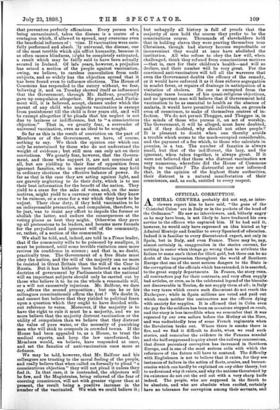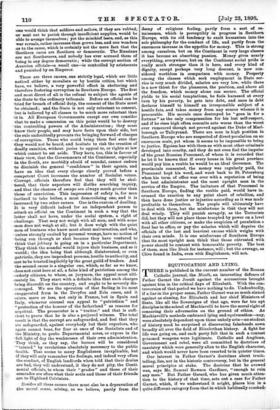OFFICIAL CORRUPTION.
A.DMIRAL CERVERA probably did not say, as inter- viewers report him to have said, "the guns of the 'Cristobal Colon' are in Italy or in the pockets of the head of- the Ordnance." He saw no interviewers, and, bitterly angry. as he may have been, is not likely to have traduced his own service to the officers who captured him. If he bad said it, . however, he would only have expressed an idea hinted at by--
Spain, but in Italy, and even France. There may be, nay, almost certainly is, exaggeration in the stories current, for nothing is easier when things go wrong than to attribute the
failure to some one's thirst for illicit gold, but there can be no doubt of the impression throughout the world of Southern Europe that one of the most serious dangers to the State is-- the corruption of the officials which has extended, it is asserted, to the great supply departments. In France, the story runs, all contractors pay for their contracts, and very often supply bad articles, or even, as in the celebrated legend of the biscuits-
not discoverable in Toulon, do not supply them at all ; in Italy the very taxes which create such discontent do not reach the
Exchequer; while in Spain millions are voted and paid out which reach neither the contractors nor the officers dying with anxiety for supplies. It is affirmed that in Cuba even the pay for the soldiers has been on occasions stopped en route,
and the story is less incredible when we remember that it was repeated by our own sailors before the Mutiny at the Nore, and was undoubtedly true of some French regiments when the Revolution broke out. Where there is smoke there is fire, and we find it difficult to doubt, when we read such stories, and remember the evidence in the Panama scandal and the half-suppressed inquiry about the railway concessions,, that direct pecuniary corruption has increased in Southern Europe, and is one of the most serious evils with which the reformers of the future will have to contend. The difficulty with Englishmen is not to believe that it exists, for they see instances of failure in the action of fleets, armies, and bureau- cracies which can hardly be explained on any other theory, but to understand why it exists, and why the nations threatened by
its existence do not cut the evil out with a very sharp knife indeed. The people, who are supposed in the South to be absolute, and who are absolute when excited, certainly have no tolerance for corruption among their servants, and One would think that soldiers and sailors, if they are robbed, or sent out to perish through insufficient supplies, would be able to avenge themselves; yet the mischief lasts, and, as this -war reveals, rather increases than grows less, and one wonders .as to the cause, which is certainly not the mere fact that the Southern races are Southern or democratic. The Russians are not Southerners, and nobody has ever accused them of ;being in any degree democratic ; while the corrupt section of Austrian officials—a small one—is controlled by aristocrats and punished by an Emperor.
There are three causes, one strictly legal, which are little noticed either by moralists or by hostile critics, but which have, we believe, a very powerful effect in sheltering and therefore fostering corruption in Southern Europe. The first and most direct of all is the refusal to subject the agents of -the State to the ordinary tribunals. Before an official can be -tried for breach of official duty, the consent of the State must be obtained; and the State is not only reluctant to consent, but is believed by all classes to be much more reluctant than
-it is. All European Governments except our own consider that to make a concession on this point would be to destroy
'the controlling powers of the Administration ; they must 'know their people, and may have facts upon their side, but the rule undoubtedly prevents the bringing forward of charges • of corruption. Those who could bring them feel sure that they would not be heard, and hesitate to risk the creation of
deadly enmities, without juries to appeal to, or rights at law --which cannot be set aside. They have, too, this in favour of their view, that the Governments of the Continent, especially in the South, are morbidly afraid of scandal, cannot endure to diminish the general " confidence " in their agents, and have an idea that every charge clearly proved before a competent Court increases the number of Socialist voters. 'Corrupt. officials therefore feel that they will be shel- tered, that their superiors will dislike searching inquiry, and that the chances of escape are always much greater than those of conviction. This impression of safety is, for men inclined to take bribes, a most demoralising one, and it is increased by two other causes. One is the custom of duelling. It is very difficult indeed for an independent person to attack an official on the Continent in such a way that the latter shall not have, under the social system, a right of challenge. That may not weigh with all men, and with some men does not weigh at all ; but it does weigh with the quiet men of business who know most about malversation, and who, unless strongly excited by personal wrongs, have no notion of -being run through or shot because they have ventured to think that jobbery is going on in a particular Department.
• They think the scandal would injure their business, and so it would ; the idea being that although disinterested, or even patriotic, they are imprudent persons, hostile to authority, and mot to be trusted implicitly by the great guild of traders. And the second cause is a singular one, which, so far as we know, does not exist here at all, a false kind of patriotism among the .orderly citizens, to whom, as jurymen, the appeal must ulti-
■ mately lie. They start with a definite idea that such charges
• bring discredit on the country, and ought to be severely dis- couraged. We see the operation of that feeling in its most exaggerated fcrm in the Dreyfus and Zola cases, and it exists, more or less, not only in France, but in Spain and Italy, whenever counsel can appeal to " patriotism " and "protection of the honour of the fatherland" as reasons for acquittal. The prosecutor is a "traitor," and that is suffi- cient to prove that he is also a perjured witness. The total result is that the corrupt are safeguarded, and feel that they are safeguarded, against everybody but their superiors, who again cannot bear, for fear at once of the Socialists and of the Ministry, to probe Departmental sores, or expose in the full light of day the weaknesses of their own administration. 'They think, as they say, the bureau will be considered -" tainted " by revelations absolutely necessary to the public 'health. That seems to many Englishmen inexplicable, but if they will only remember the feelings, and indeed very often the conduct, of English landlords when told that their drains are bad, they will understand, if they do not pity, the Conti. nental officials, to whom their "grades" and those of their comrades are often what their souls and those of their friends are to Highland Calvinists.
Besides all these causes there must also be a depravation of the moral sense, arising, as we believe, partly from the decay of religious feeling, partly from a sort of re- naissance, which is perceptibly in progress in Southern Europe, with its old tendency to exalt humanism into the sole philosophy for the conduct of life, and partly from the enormous increase in the appetite for money. This is strong among ourselves, but on the Continent in very large classes it has become an absorbing passion. Money gives nearly everything, everywhere, but on the Continent social pride is
really much stronger than it is here, and every kind of dignity, except perhaps very long descent, is now con- sidered worthless in comparison with money. Property among the classes which seek employment in State ser- vice is very much divided, salaries are very low, while there is a new thirst for the pleasures, the position, and above all the freedom, which money alone can secure. The official yields to his social temptations, he feels harassed at every turn by his poverty, he gets into debt, and once in debt declares himself to himself an irresponsible subject of a hostile fate, and takes money from any source whence it is procurable. His morale once destroyed he "goes in for a fortune" as the only compensation for his lost self-respect, and if he rises high often commits acts worse than the worst ever rumoured though not proved against the Duke of Marl- borough or Talleyrand. There are men in high position in Southern Europe who are suspected of direct peculation on an enormous scale, yet whom it seems to be impossible to bring to justice. Egoism has with them as with most other criminals developed into cruelty, and they do not even feel the impulse of the great Russian Proconsul, of whom it is recorded that he let it be known that if every house in his great province would pay him a rouble he would be an ideal Governor. The provincials consented, the money was regularly paid, the Proconsul kept his word, and went back to St. Petersburg when his term of office was over with a reputation of being the best administrator and the most upright man in the service of the Empire. The imitators of that Proconsul in Southern Europe, finding the rouble paid, would have in- creased the exaction to any point short of rebellion, and then have done justice or injustice according as it was made profitable to themselves. The people will ultimately have to deal with them, but the misfortune is that they will not deal wisely. Whey will punish savagely, as the Terrorists did, but they will not place those tempted by power on a level with all other citizens, or make the suspicion of peculation a final bar to office, or pay the salaries which will deprive the officials of the last and heaviest excuse which weighs with their own minds. It is one misfortune of Southern Europe that its most upright men think that those entrusted with power should be content with honourable poverty. The best of them, men like Deak for instance, will ; but the average, as Clive found in India, even with Englishmen, will not.



































 Previous page
Previous page